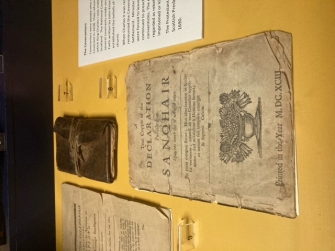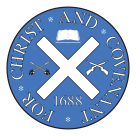The Sanquhar Declaration
It is not amongst the smallest of the Lord’s mercies to this poor land that there have always been some who have given their testimony against every course of defetion, (that many are guilty of) which is a token for good, that He doth not as yet intend to cast us off altogether, but that He will leave a remnant in whom He will be glorious, if they, through His grace, keep themselves clean still, and walk in His way and method, as it has been walked in and owned by Him in our predecessors of truly worthy memory, in their carrying on of our noble work of reformation in the several steps thereof, from popery, prelacy, and likewise Erastian supremacy, so much usurped by him, who (it is true so far as we know) is descended from the race of our kings, yet he hath so far deborded from what he ought to have been, by his perjury and usurpation in Church matters, and tyranny in matters civil, as is known by the whole land, that we have just reason to account it one of the Lord's great controversies against us, that we have not disowned him and the men of his practices, (whether inferior magistrates or any other) as enemies to our Lord and His crown, and the true Protestant and Presbyterian interest in thir lands, our Lord's espoused bride and Church. Therefore, although we be for government and governors such as the Word of our God and our Covenant allows, yet we for ourselves and all that will adhere to us as the representatives of the true Presbyterian Kirk and Covenanted nation of Scotland, considering the great hazard of lying under such a sin any longer, do by thir presents disown Charles Stuart, that has been reigning (or rather tyrannizing as we may say) on the throne of Britain these years bygone, as having any right, title to, or interest in, the said Crown of Scotland for government, as forfeited several years since, by his perjury and breach of covenant both to God and His Kirk, and usurpation of His crown and royal prerogatives therein, and many other breaches in matters ecclesiastic, and by his tyranny and breach of the very leges regnandi in matters civil. For-which reason we declare, that several years since he should have been denuded of being king, ruler, or magistrate, or of having any power to act, or to be obeyed as such. As also, we, being under the standard of our Lord Jesus Christ, Captain of Salvation, do declare a war with such a tyrant and usurper, and all the men of his practices, as enemies to our Lord Jesus Christ and His cause and covenants; and against all such as have strengthened him, sided with, or any wise acknowledged him in his tyranny, civil or ecclesiastic, yea, against all such as shall strengthen, side with, or any wise acknowledge any other in the like usurpation and tyranny, far more against such as would betray or deliver up our free reformed mother-kirk unto the bondage of anti-christ, the Pope of Rome. And by this we homologate that testimony given at Rutherglen, the 29th of May, 1679, and all the faithful testimonies of these who have gone before, as also of these who have suffered of late. And we do disclaim that Declaration published at Hamilton, June, 1679, chiefly because it takes in the king's interest, which we are several years since loosed from, because of the foresaid reasons, and others, which may after this (if the Lord will) be published. As also we disown, and by this resent the reception of the Duke of York, that professed papist, as repugnant to our principles and vows to the Most High God, and as that which is the great, though not alone, just reproach of our Kirk and nation. We also by this protest against his succeeding to the crown; and whatever has been done, or any are essaying to do in this land (given to the Lord), in prejudice to our work of reformation. And to conclude, we hope after this none will blame us for, or offend at our rewarding these that are against us as they have done to us as the Lord gives opportunity. This is not to exclude any that have declined, if they be willing to give satisfaction according to the degree of their offence.
Given at Sanquhar, June 22nd, 1680.








